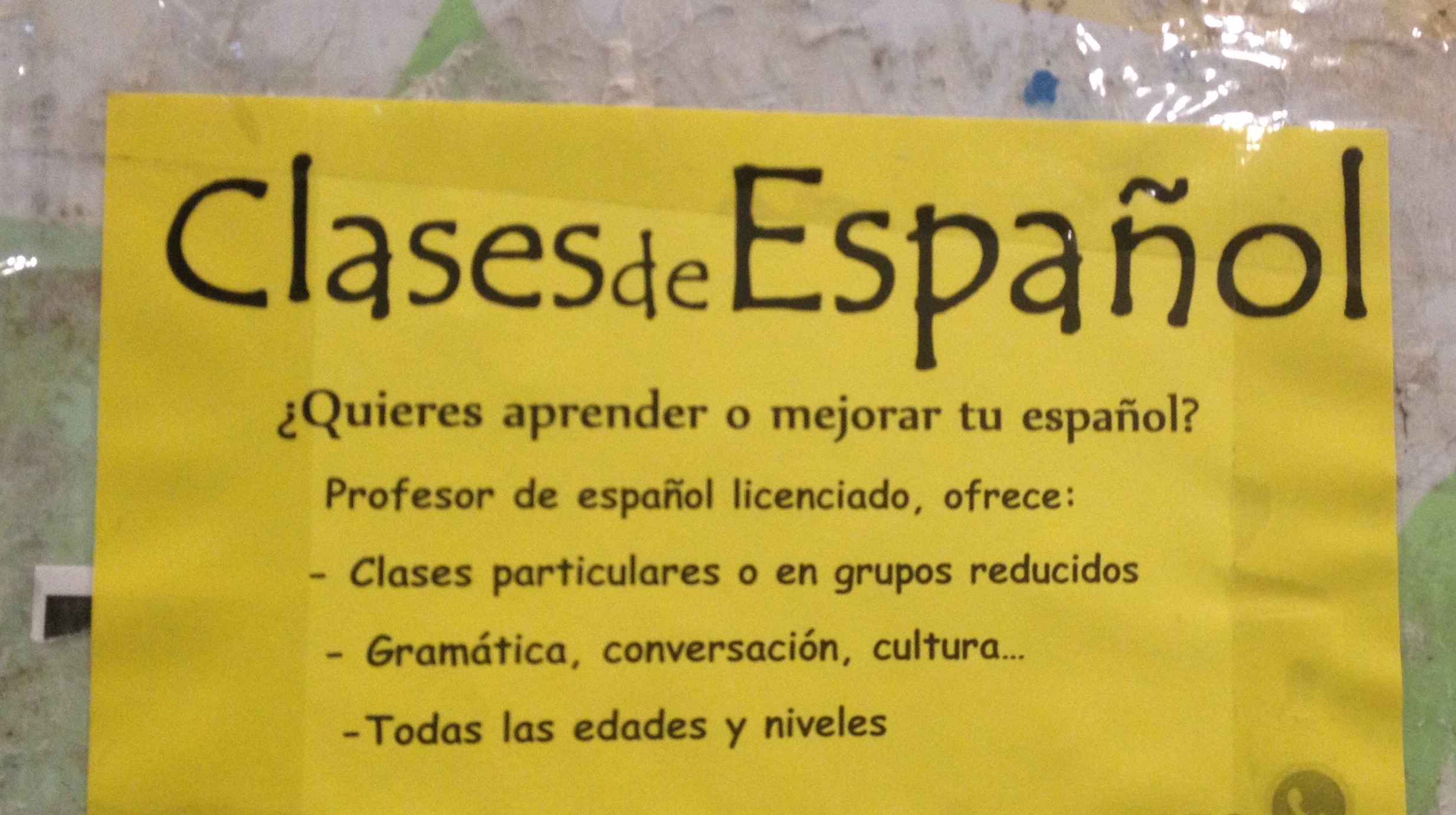How a Tutor Boosted our Language Fluency
 My husband and I spent the month of March in Seville, Spain (left: La Giralda under blue sky, seen from el Alcázar), mostly in sunny, warm weather, while our home town, Boston, USA, kept getting bombarded with relentless snowfalls.
My husband and I spent the month of March in Seville, Spain (left: La Giralda under blue sky, seen from el Alcázar), mostly in sunny, warm weather, while our home town, Boston, USA, kept getting bombarded with relentless snowfalls.
We were lucky to be away at that time, but the main reason for our trip was to improve our Spanish through the best kind of "immersion" that we could set up.
It's not easy for adult foreigners to meet and engage with locals, so we had a plan: We set up "live" language exchanges in advance and were determined to find a local teacher for conversation lessons.
Warming up with Language Exchanges
Language Exchanges with locals are a great way to start practicing speaking in a relaxed, friendly way. We did these the two of us together, armed with questions and a few scripted, memorized sentences. (see also our recent post: 4 Tips for Improving Your Foreign Language during a One-Month Stay).
To be honest, our initial conversations were pretty halting. To be able to talk about your own experiences in a casual, spontaneous way, you need to know present and past verb forms.
For Spanish, with its different past tenses, that's quite a task. Using just the simple past gets the basic message across but often not all of the meaning.
Already our first exchange conversation had us go back to our place and review the basic tenses of common verbs such as "hacer, estar, ser, ir, haber, poder, tener, etc." I wrote out the forms by hand on sheets of paper. We memorized them and practiced them in between sightseeing stints.
It wasn't just the grammar which made a normal conversation challenging. All of our exchange partners were from the Seville area and spoke the local city dialect. (Local people from Seville talk fast and drop some letters, including most occurrences of the letter 's' in the middle or end of words.) In time, though, we got used to the dropped letters.
Doing those conversations during our first two weeks was a big step forward. It felt really good to begin understanding spontaneous questions and to learn how to ask them.
The great thing about meeting with others is that your head starts preparing and practicing for the conversations in advance and processes them afterwards.
It's another level of learning, quite focused and effective.
Adding a Tutor
We intended to ask our language partners if they knew any tutors for our remaining two weeks, but instead came across a notice at a nearby square. It offered: Clases de Español (see photo), and had a phone number attached. I mustered my Spanish and texted our interest in 7 tutoring sessions. We got an answer quickly and set up a first meeting for the next day.
for our remaining two weeks, but instead came across a notice at a nearby square. It offered: Clases de Español (see photo), and had a phone number attached. I mustered my Spanish and texted our interest in 7 tutoring sessions. We got an answer quickly and set up a first meeting for the next day.
Carlos, a licensed teacher of Spanish at a local school, spoke no other foreign languages except some Italian. That he spoke no English was a huge stroke of luck for us. It forced us to express and explain ourselves only in Spanish. He in turn, being a trained teacher, knew just when and how to correct us without interrupting the conversation too much.
A Conversation Format
You can't learn a language without speaking it, and engaging in a conversation is clearly the best way to level up your speaking skills.
On the one hand you are listening to the other speaker(s) and interpreting what is being said; on the other, you are beginning to frame an answer, but at the same time have to keep in mind grammatical points such as verb endings, tenses, pronouns, agreement, etc. Besides, your answer has to have some momentum to keep the conversation going. Stopping at every second or third word is not going to cut it.
Being in a live conversation gives you the chance to ask questions. If there's something you don't understand, you can just ask for an explanation or a clarification. Questions are also a good way to keep the conversation going and to give you a certain amount of conversational control.
Topics for Conversation
Our main intent was to practice conversation, but to keep conversations moving along you need to have interesting things to discuss. Carlos asked us for topics we'd like to focus on.
During our stay in Seville, general elections in Andalusia were happening and one of our sessions was a question-and-answer session about Andalusia's political history, and we explained voting processes and party structure in the U.S.
Also, at the end of our visit, the amazing festivities of "Semana Santa" (Easter week) began. (See above a picture of one of the many processions that occur every day from Palm Sunday to Easter. A future post will provide more details.)
Besides discussing some of the local traditions of Easter week with us, Carlos also told us of his memories of growing up in Seville, especially his experiences as a child during the Easter week festivities. This made the lessons quite personal and interesting.
Learning to Rephrase
When you're talking about something in a foreign language, it can often happen that you're looking for a specific word, but just cannot remember it. An excellent skill to practice is to rephrase what you're trying to say and express it in different words, rather than stop short and rack your brains.
Knowing that English would not help, we were forced to say things "in other words," again and again, and actually got pretty good at it. To be able to do this, of course, you need enough vocabulary. Reading the local newspaper every day was helpful for the topics we were talking about.
Clarifying Grammar in Context
Conversational practice is an ideal vehicle for learning grammar in context.  I normally use a grammar text to look up questions that I have. I rarely start with a text book to learn grammar.
I normally use a grammar text to look up questions that I have. I rarely start with a text book to learn grammar.
In our conversations with Carlos, we started out by talking about things we had done, i.e. we had to use Spanish past verb tenses. Since there are several to choose from and they differ in usage from English past verb tenses, our conversations were a effective way to practice the Spanish forms.
Carlos gave us a helpful, simplified guideline for which tense to use when. The "imperfect tense" (imperfecto) sets the scene that you embellish with other events. The "simple past" (pretérito) expresses an event in the past that is finished and doesn't relate to the present. The "present perfect" (pretérito perfecto) is a past, finished event that nevertheless still impacts the present moment.
Understanding which verb tense to use as we talked about past events and experiences was a great way to learn a difficult chunk of grammar.
The Local Dialect
At first, our tutor spoke a little more carefully and avoided dropping the "s" from words as he talked. But after a couple of sessions, he fell back into his dialect pronunciation. We could have asked him to use a more standard way of speaking, but found in time that we could understand him quite well. In the end, it has made our Spanish a little more versatile.
Carlos explained to us that the Spanish of Andalusia is closer to Latin American Spanish than that which is spoken in other parts of Spain and that was due to large waves of emigration from Andalusia to the Spanish colonies in the Americas.
Our Fluency Boost
Did our month in Seville make us fluent Spanish speakers? Not as fluent as we'd like to be. But it gave our fluency a big boost.
make us fluent Spanish speakers? Not as fluent as we'd like to be. But it gave our fluency a big boost.
When we compare our initial taxi ride from the airport to Seville at the beginning of our stay, to our ride from Seville to the airport at the end of our stay, there was quite a difference.
At the beginning, we asked a few short questions or made brief comments and didn't understand a lot of what the taxi driver responded. At the end, we were chatting away with the taxi driver about our stay, the elections, Semana Santa, differences of taxi ownership and taxi colors in Spanish cities (In Seville they are all white) etc. We clearly had made noticeable progress.
Now we just have to figure out how we can give our language fluency another boost!
